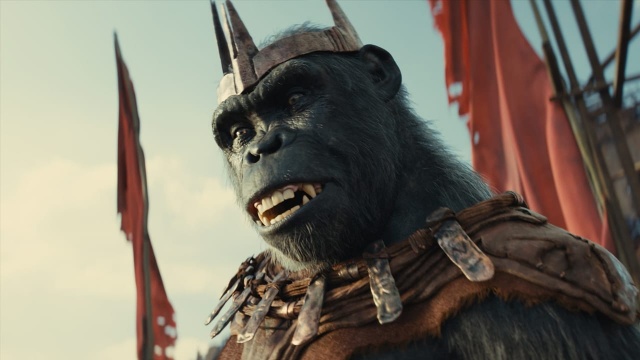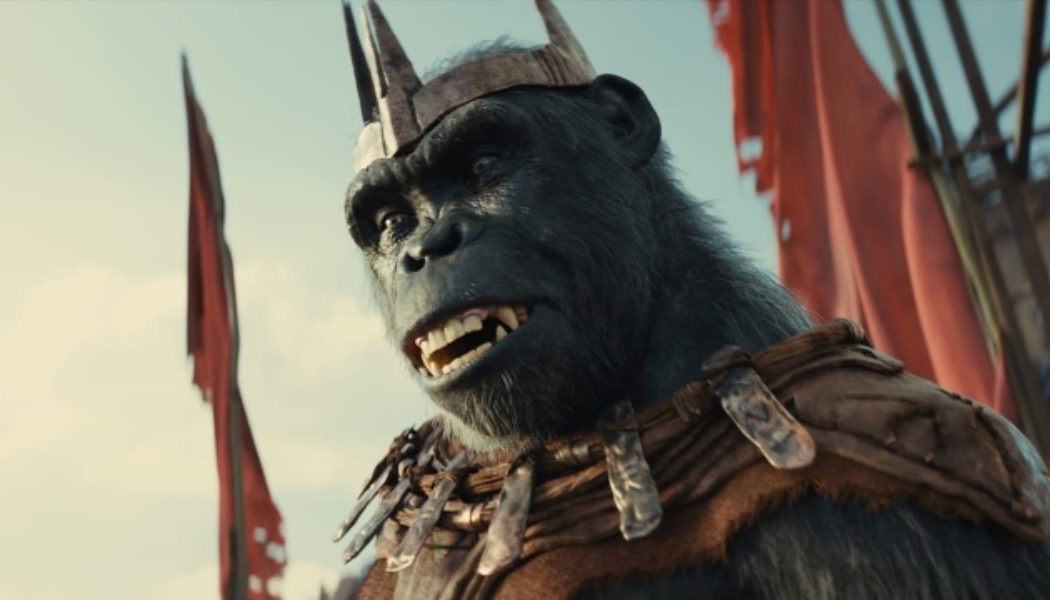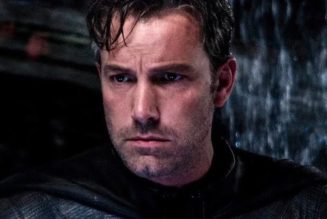
★★★★½
Director Wes Ball (The Maze Runner series) helms this enthralling installment in the Apes franchise with Kingdom of the Planet of the Apes. Using an existing franchise and moving it forward could have resulted in a jumbled, disjointed mess. But in this case, Josh Friedman (Foundation) treats the subject carefully and everything gels together into a finely executed drama.
Many generations after gaining speech, Noa (Owen Teague), Soona (Lydia Peckham), and Anaya (Travis Jeffery), members of the Eagle Clan of apes, are about to be initiated into their tribe’s unique rite through the falcon eggs they climbed to get. But during the night their homes are destroyed by a rival clan led by Proximus (Kevin Durand). Everyone but Noa is captured or killed. Noa, determined to rescue his family and friends, sets out to find them. Along the way, he gains two allies – an orangutan named Raka (Peter Macon), the last keeper of Caesar’s law, and a girl named Mae (Freya Allan), also seeking Proximus’ camp. When they arrive, it is revealed that Proximus is after ancient human technology, and only by allying can Noa and Mae stop him.
This long-standing, doubly-revived franchise has a lot of dedicated and sometimes critical followers. Ball and Friedman needed to tread carefully as they moved the story far into the future from the prior Apes saga. Happily, both did a fantastic job. Friedman’s engaging story makes the audience quickly forget that Caesar and his laws are far in the past, while also keeping his beliefs alive through the character of Raka. Together, they build a new world from the old, while keeping the characters interesting and believable. And to make things even more interesting, there are several callbacks to the original 1960s Planet of the Apes films; both through the music and props. These callbacks are placed in a calculated, careful way that doesn’t come across as campy or trite. The voice acting by all the players is good, especially from Macon, and matches the CGI work well.
A well-crafted story like this might overshadow the CGI work. This is not the case here. From the very first scene, the audience can see the emotions on the characters’ faces and through their body language as though they weren’t animated at all. This is one of the most incredibly realistic CGI renderings set to film, and a far cry from the bland, smooth expressions that CGI started with, and even still has occasionally. Clearly, the animation team has kept up with, and possibly even created some of, the latest advancements in the industry. In addition to the CGI, the set designers create a beautifully cohesive post-pandemic world in the human and ape settlements, presumably with the guidance of archaeologists and anthropologists. There is a real sense of wonder and presence in how the apes’ civilization has developed, giving the audience an immersive experience that keeps them on the edge of their seats.
Kingdom of the Planet of the Apes is a stunningly beautiful entry into the Apes franchise, and audiences will not be disappointed by the look, feel, or intensity of the story presented. If not the best in the entire series, it is definitely a contender for the crown.









